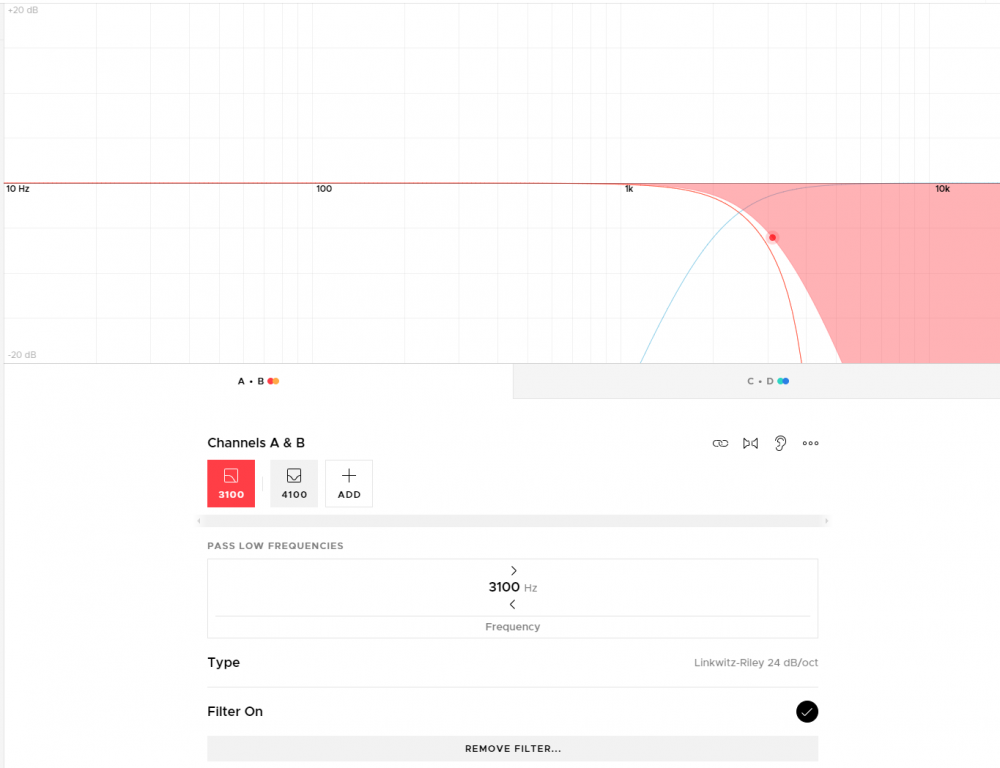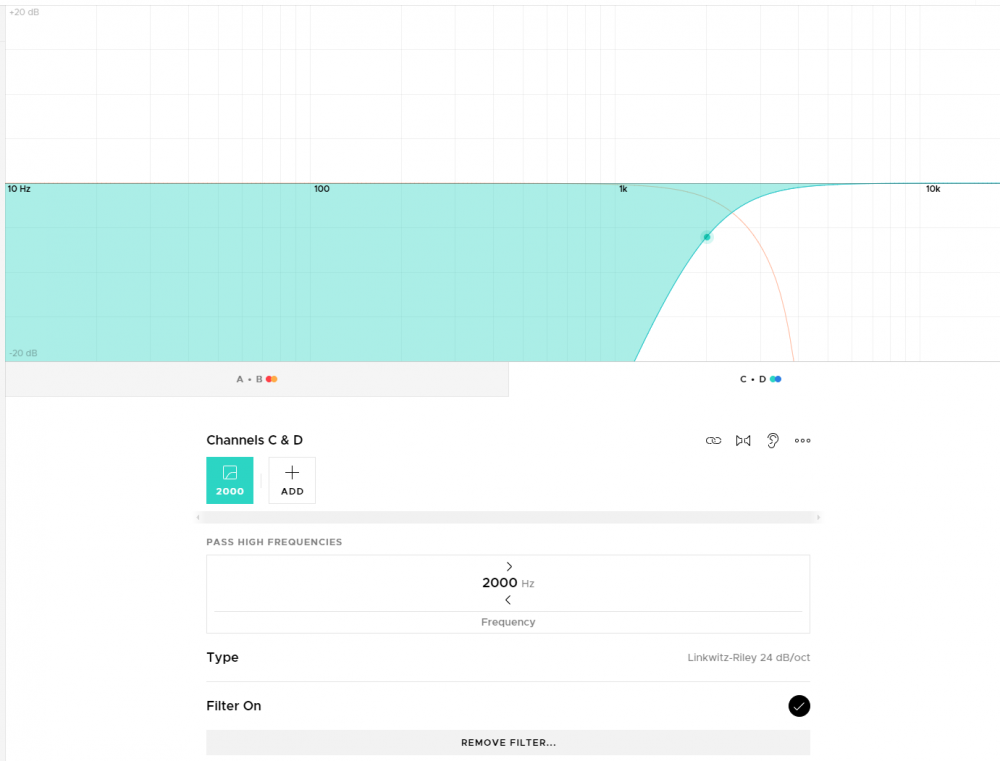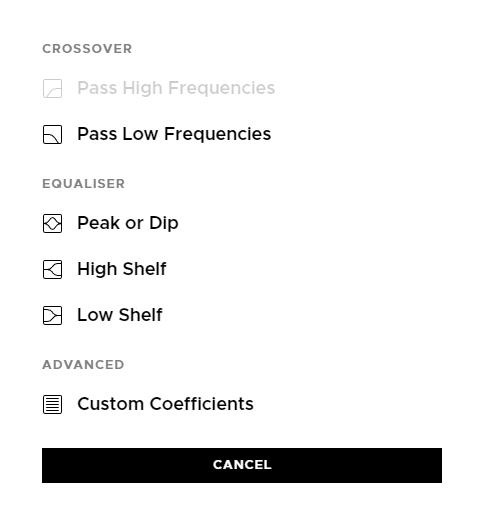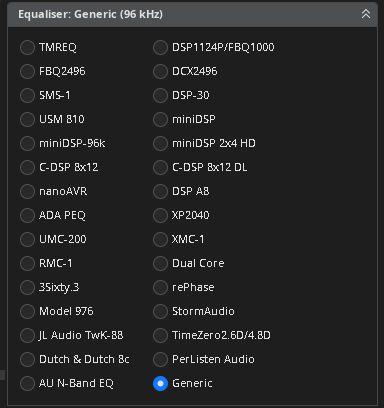Site Links
Howdy, Stranger!
It looks like you're new here. If you want to get involved, click one of these buttons!
Quick Links
Categories
In this Discussion
Who's Online (0)
Hifiberry Beocreate amp
in DIY
Ani used this amp for his active speakers, I was watching one for sale and when the seller dropped the price to $175 shipped with PSU included I snagged it.
The "easiest" way to use it is with a raspberry pi and the HifiberryOS distro, the latest does not work BTW...
Once you load it you get easy blocks to build what you want:


Quick and dirty example. You have a couple options:

Now I need to get some measuring rig and play properly with it.
For more advance users, you can connect to the DSP using Sigmastudio and play to your heart content.





Comments
This is a really cool device for sure, and I wonder how hard it would be to tap the line level outs.
3 TPA3128D2
4 RINP I Positive audio input for right channel. Connect to GND for MONO mode.
5 RINN I Negative audio input for right channel. Connect to GND for MONO mode.
10 LINP I Positive audio input for left channel. Connect to GND for PBTL mode.
11 LINN I Negative audio input for left channel. Connect to GND for PBTL mode.
I guess the 2 tweeter (30W) channels are going to a single one.
1 x 60w should be a BTL one.
https://www.ti.com/lit/ds/symlink/tpa3128d2.pdf?ts=1666908718703&ref_url=https%3A%2F%2Fwww.ti.com%2Fproduct%2FTPA3128D2
P12 and P13 looks like analog line level signal taps.
They do look that way, the pins match.
Hey Ani,
My interest is piqued now that I've looked into REW a bit more. How close were your final measurements to the clac/sim in REW? I'm only asking because of an article I read years ago showing how each manufacturer interprets filter settings a little differently. It seems like REW was coded with the MiniDSP in mind. I know my old BSS DSP box uses Octaves instead of Q for filter width. Things might be more standardized these days and I imagine importing biquad files would put an end to those discrepancies.
http://www.bennettprescott.com/downloads/TwoProcessors.pdf
REW supports a lot more than just miniDSP.

I would be very surprised if the Hifberry software implements anything more than the textbook biquad calculations, and of course you can expect the same with SigmaStudio.
Differences in filter result with same parameters across manufacturers can vary from very similar to wildly different, recently there was some examples of this from Kimmo.
So am I incorrect to assume importing biquad data eliminates the disparities seen between brands? If so, I may look into trying something using plugins in a DAW.
No. The differences are in the biquad math, some manufacturer's choose to throw away the textbook and re-invent their own math. Using same coefficients across different manufacturers provides the same error as shown in previous images.
For reference, the textbook:
https://www.w3.org/TR/audio-eq-cookbook/
If your specific DSP isn't supported in the list in REW, You can create some basic filter in your DSP and compare to the manufacturer's in the list to get a closely matching equivalent result.
1) Parametric EQ 1000 Hz, Q=1.0, A=+10 dB and Q=2.0, A=-5.0 dB.
2) 1st order Shelving low pass 200 Hz, A=+10 dB and A=-5 dB.
3) 2nd order Shelving low pass 200 Hz, A=+10 dB Q=0.71 and A=-5 dB, Q=1.0.
4) Bessel low pass filter, 1000 Hz, 18 dB/oct.
Hmm...that's a bit of a bummer that everyone isn't following the same protocol. I'll just stick with the manual entry method.
I hope to give REW a whirl in the next few days. I'll see how a MiniDSP 2x4, BSS 3088 and a simple EQ plugin in Reaper differ.
Ran a quick test last night. I set up -12dB 1/3 Octave cuts at 100Hz & 1KHz in each unit. Both the BSS 3088 and Reaper's basic parametric plugin use Octaves instead of Q. Bennett Prescott's Bandwidth chart indicates that would be a Q of 4.3 in the MiniDSP. I was expecting some variance, but all three are very close. What's with the 100Hz cuts? It's set for -12 and we're only reaching -10dB. Could it be the 1/24th smoothing in ARTA?
Could be, turn off smoothing and find out…
Nice to see you’ve got a fairly good match.
Yep, just tried REW and things look like they should. It was the smoothing in ARTA.